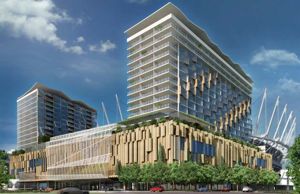
The backdrop for the three-day Canadian Gaming Summit now underway in Vancouver couldn't be more intriguing.
On Friday, the FBI shut down the three biggest American-targeted poker websites and got warrants to arrest 11 executives -- including Canadians Isai Scheinberg, Ryan Lang and Nelson Burtnick.
On Sunday, the NDP chose Adrian Dix as its new leader. The Vancouver-Kingsway MLA became infamous amid 1999's casino licence conflict of interest scandal. Dix was an aide to Premier Glen Clark and back-dated a memo which falsely claimed to exonerate Clark, who was forced to resign.
But this week's top storyline in the host city for the biggest Canadian gambling convention of the year will happen not at the Vancouver Convention Centre, but at Vancouver city hall.
On Tuesday afternoon, city council will decide whether to allow Las Vegas-based Paragon Gaming to move and expand its Edgewater Casino from the Plaza of Nations to a proposed $500 million, two-Marriott hotel complex on provincial land beside B.C. Place Stadium.
More jobs vs. social concerns
Over three nights and two days since March 7, city council heard 83 anti-casino campaigners among the 145 who spoke. Of 1,849 letters received, 1,027 came from casino boosters.
Retired civic, provincial and federal politicians, academics, artists, cops and lawyers voiced their opposition under the Vancouver Not Vegas coalition's banner.
Edgewater workers, dressed in yellow shirts reading "save my job," spoke one-by-one. Many were bussed to city hall in charters paid by their employer. Representatives of various unions, including the casino's CAW local, spoke. PavCo chairman David Podmore, in the dying minutes of the public hearing on April 10, offered on Paragon's behalf to cut the desired slot machines from 1,500 to 1,200 for the first two years.
PavCo wants Paragon's lease revenue to help pay a small portion of the stadium's $563 million renovation. The Crown corporation also compiled a list of its own supporters, with whom there are commercial relations. None could be more blatant than David Atkins, the 2010 Winter Olympics ceremonies producer from Australia paid almost $12 million by PavCo for costs of the B.C. Place pageants.
There is no doubt the development would mean more jobs. But the Vision Vancouver majority is faced with a dilemma. Do unionized jobs building and operating a casino conflict with the vision to make Vancouver the world's most sustainable city by 2020? A round-the-clock gambling facility with at least 1,200 slot machines containing sophisticated electronics is not going to help the environment.
Public opinion polls by Ipsos Reid and Justason Market Intelligence found City of Vancouver residents are narrowly opposed. While 59 per cent of Ipsos-Reid respondents agree that construction and operation would benefit the economy, 67 per cent say it would bring significant social costs, such as crime and gambling addiction.
"That's something people are concerned about," said Sandy Garossino of Vancouver Not Vegas. "That hasn't really been addressed in the application."
'We're safer than shopping malls': Paragon president
Garossino's group released a letter from 16 retired senior police officers who fear the casino would be a haven for criminals and gambling addicts.
"That organized criminals and gang members frequent B.C. casinos, and easily use them to launder money, or use them as sites for the operation of loan-sharking and prostitution, is well known," said the letter. "Policing in casinos and racetracks requires a robust commitment to real enforcement of the law -- a commitment that is plainly lacking at the present time."
CBC obtained three Gaming Policy and Enforcement Branch reports about suspicious Edgewater Casino transactions from 2010, including a gambler who brought $90,000 in $20 bills and $10,600 in $50 bills last July. Scott Menke, president of Paragon, downplayed such incidents.
"There's crimes tied to nursing homes," Menke said in February after a Vancouver Board of Trade speech. "The reality is we work as an industry to make this the safest environment to come and spend your time.
"We're safer than shopping malls."
When he appeared before council, deputy police chief Warren Lemcke stopped short of agreeing with Menke. He did say Edgewater was substantially less of a problem than a nearby Plaza of Nations nightclub, but revealed that the VPD database actually does not keep track of gambling-related crimes.
Vancouver Coastal Health's Dr. John Carsley advised council that the "uncertainty of the effect on problem gambling in the community" was enough for it to scuttle the proposal.
Carsley said problem gambling can lead to health problems, family breakups, crime and suicide.
The 2007 B.C. Problem Gambling Prevalence Study estimated 8.7 per cent of adults are at-risk of gambling addictions and 4.6 per cent already have problems. The overall level was unchanged from a 2002 study, but the subset of severe addicts more than doubled from 0.4 per cent to 0.9 per cent.
B.C.'s 128,000 moderate problem gamblers and 31,000 severe problem gamblers would be enough to fill B.C. Place almost three times.
Roll the dice, split the party?
The last time Vancouver city council was faced with such a decision was July 22, 2004 when Great Canadian Gaming wanted to install 600 slot machines at Hastings Racecourse, to keep thoroughbred horse racing viable at the 1889-opened city-owned track.
The 2004 debate was centred around Hastings residents not wanting a casino in their backyard. On the other side was the horse racing industry and its dwindling fans, coupled with charities wanting a bigger piece of the province's gambling profits pie.
Populist COPE Mayor Larry Campbell broke the 5-5 deadlock. The five opposed were among the eight councillors in Campbell's COPE caucus. Campbell and allies Raymond Louie, Tim Stevenson and Jim Green eventually split from the left-wing party and formed Vision Vancouver. Green lost to Sam Sullivan of the NPA in 2005, but Vision Vancouver roared to victory under ex-NDP MLA Gregor Robertson. Louie and Stevenson remain on council. Louie is now chairman of the Pacific National Exhibition.
"I have no thoughts on it one way or another" said Campbell, Vancouver's mayor from 2002 to 2005, in an April 6 interview. "It's not something that's been on my radar."
Campbell, who became a Liberal senator in 2005, was appointed a GCG director in 2008.
Struggling Hastings has never delivered the forecast $6.5 million annual royalties to the city. Since slots arrived there in 2007, the city received only $3.52 million. Paragon and PavCo claim the city stands to receive another $10 million a year if Edgewater's move is okayed.
In a teleconference with shareholders and analysts, GCG threatened March 17 to close the racing when the lease expires in Nov. 2012. The 15-year renewal option contemplates more capital investments that GCG says are simply not feasible in an era when horse racing is in decline.
"Both the company and the city need to work on and come to a resolution on it," Campbell said. "Obviously I wanted the track because it has so many jobs and is so historical, but it also is a business." ![]()
Read more: Labour + Industry
















Tyee Commenting Guidelines
Comments that violate guidelines risk being deleted, and violations may result in a temporary or permanent user ban. Maintain the spirit of good conversation to stay in the discussion.
*Please note The Tyee is not a forum for spreading misinformation about COVID-19, denying its existence or minimizing its risk to public health.
Do:
Do not: